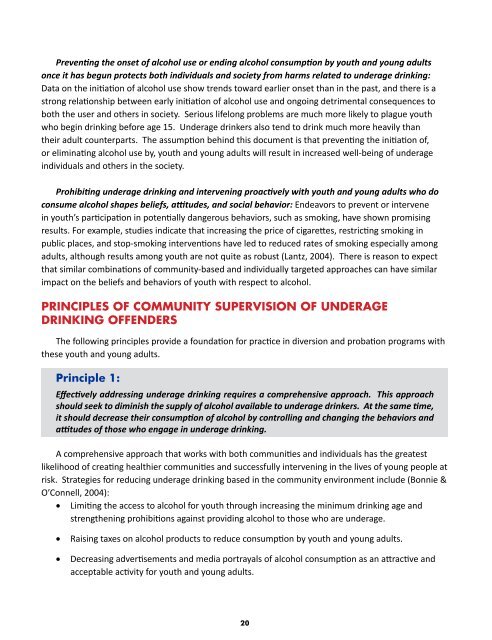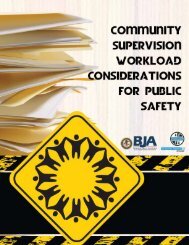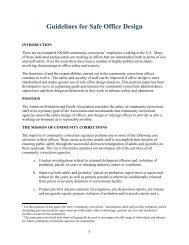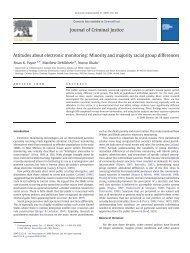Intervention Principles and Practice Guidelines for - Underage ...
Intervention Principles and Practice Guidelines for - Underage ...
Intervention Principles and Practice Guidelines for - Underage ...
You also want an ePaper? Increase the reach of your titles
YUMPU automatically turns print PDFs into web optimized ePapers that Google loves.
Preventing the onset of alcohol use or ending alcohol consumption by youth <strong>and</strong> young adults<br />
once it has begun protects both individuals <strong>and</strong> society from harms related to underage drinking:<br />
Data on the initiation of alcohol use show trends toward earlier onset than in the past, <strong>and</strong> there is a<br />
strong relationship between early initiation of alcohol use <strong>and</strong> ongoing detrimental consequences to<br />
both the user <strong>and</strong> others in society. Serious lifelong problems are much more likely to plague youth<br />
who begin drinking be<strong>for</strong>e age 15. <strong>Underage</strong> drinkers also tend to drink much more heavily than<br />
their adult counterparts. The assumption behind this document is that preventing the initiation of,<br />
or eliminating alcohol use by, youth <strong>and</strong> young adults will result in increased well-being of underage<br />
individuals <strong>and</strong> others in the society.<br />
Prohibiting underage drinking <strong>and</strong> intervening proactively with youth <strong>and</strong> young adults who do<br />
consume alcohol shapes beliefs, attitudes, <strong>and</strong> social behavior: Endeavors to prevent or intervene<br />
in youth’s participation in potentially dangerous behaviors, such as smoking, have shown promising<br />
results. For example, studies indicate that increasing the price of cigarettes, restricting smoking in<br />
public places, <strong>and</strong> stop-smoking interventions have led to reduced rates of smoking especially among<br />
adults, although results among youth are not quite as robust (Lantz, 2004). There is reason to expect<br />
that similar combinations of community-based <strong>and</strong> individually targeted approaches can have similar<br />
impact on the beliefs <strong>and</strong> behaviors of youth with respect to alcohol.<br />
<strong>Principles</strong> of Community Supervision of <strong>Underage</strong><br />
Drinking Offenders<br />
The following principles provide a foundation <strong>for</strong> practice in diversion <strong>and</strong> probation programs with<br />
these youth <strong>and</strong> young adults.<br />
Principle 1:<br />
Effectively addressing underage drinking requires a comprehensive approach. This approach<br />
should seek to diminish the supply of alcohol available to underage drinkers. At the same time,<br />
it should decrease their consumption of alcohol by controlling <strong>and</strong> changing the behaviors <strong>and</strong><br />
attitudes of those who engage in underage drinking.<br />
A comprehensive approach that works with both communities <strong>and</strong> individuals has the greatest<br />
likelihood of creating healthier communities <strong>and</strong> successfully intervening in the lives of young people at<br />
risk. Strategies <strong>for</strong> reducing underage drinking based in the community environment include (Bonnie &<br />
O’Connell, 2004):<br />
• Limiting the access to alcohol <strong>for</strong> youth through increasing the minimum drinking age <strong>and</strong><br />
strengthening prohibitions against providing alcohol to those who are underage.<br />
• Raising taxes on alcohol products to reduce consumption by youth <strong>and</strong> young adults.<br />
• Decreasing advertisements <strong>and</strong> media portrayals of alcohol consumption as an attractive <strong>and</strong><br />
acceptable activity <strong>for</strong> youth <strong>and</strong> young adults.<br />
20

















